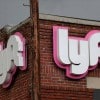Analysis | The Technology 202: Twitter placed the political ad ball in Facebook’s court – The Washington Post
Ctrl + N

Twitter CEO Jack Dorsey leaves after his talk with French President Emmanuel Macron at the Elysee Palace in Paris. (AP Photo/Francois Mori, File)
Ball’s in your court, Facebook. Twitter’s announcement that it will stop accepting all political ads landed a direct blow on the giant social network as it seeks to parry a growing storm over its controversial policy that allows politicians to lie in ads.
Twitter chief executive Jack Dorsey came out swinging yesterday right before Facebook’s earnings call by saying the company would no longer accept ads that refer to a candidate, an election or hot-button political issues, like immigration or climate change. The company plans to provide more details on the policy by Nov. 15, and it will take effect Nov. 22.
Without ever mentioning him by name, Dorsey took aim at Facebook head Mark Zuckerberg as the social media behemoth is struggling with criticism that it won’t fact check ads by politicians while it will do so with third-party political ads. For weeks, Zuckerberg has been arguing that political ads are a form of free expression, and he reasserted that on the earning’s call. Zuckerberg said rather than getting rid of political ads altogether, the focus should be on ad transparency. He estimated ads from politicians will account for less than 0.5 percent of the company’s revenue next year.
“In a democracy, I don’t think it’s right for private companies to censor politicians or the news,” Zuckerberg said.
“And although I’ve considered whether we should not carry these ads in the past, and I’ll continue to do so, on balance so far I’ve thought we should continue,” he added. “Ads can be an important part of voice — especially for candidates and advocacy groups the media might not otherwise cover so they can get their message into debates.”
The back-and-forth marks a new phase in a long-running feud between Twitter and Facebook: Zuckerberg, for example, took a dig at Twitter in a call with reporters earlier this year when he said the amount of Facebook’s budget that goes toward safety and security systems is greater than Twitter’s whole revenue. And there’s a long history of Facebook copying some of Twitter’s more popular features.
“Mr. Dorsey, like many others, is fed up with the company,” said Dipayan Ghosh, the co-director of the Platform Accountability Project at the Harvard Kennedy School and former Facebook employee. “Some of it might be commercially driven, but most all of it is that [Dorsey] is upset about the nature of Facebook and its insidious effect on political circumstances in this country.”
New York Times reporter Mike Isaac said on Twitter:
Democrats have been some of the most vocal opponents of Facebook’s policy, and some seized on Twitter’s announcement to add pressure to Facebook to reconsider its rules. From Hillary Clinton:
Rep. Alexandria Ocasio-Cortez (D-N.Y.) said on Twitter if a company won’t do basic fact-checking on political ads, they shouldn’t run them at all:
Former vice president Joe Biden’s campaign– which has complained since Facebook allowed President Trump’s campaign to run an ad makinge false claims about the presidential candidate’s ties to Ukraine — had a more measured response.
“It would be unfortunate to suggest that the only option available to social media companies … is the full withdrawal of political advertising,” Biden campaign spokesman Bill Russo said about Twitter in a statement shared with my colleagues Tony Romm and Isaac Stanley-Becker, “but when faced with a choice between ad dollars and the integrity of our democracy, it is encouraging that, for once, revenue did not win out.”
But Twitter did receive some backlash to the announcement as Trump’s campaign seized on the move to reignite criticism the social network is biased against conservatives — an unsubstantiated claim the technology companies have denied. From Brad Parscale, Trump’s campaign manager:
Twitter’s own struggles with moderating speech on its platform are far from over. Civil rights advocates were swift to raise concerns that the company’s ad policy doesn’t go far enough.
“Twitter’s decision is not a comprehensive or long-term solution to address online hate, but the move is a step ahead of Facebook,” said Jessica J. González, co-founder of Change the Terms, a coalition of civil rights groups, said in a statement. “The decision to ban all political advertising helps prevent politicians’ paid-for hate and misinformation from spreading on Twitter, but ignores the racial animus at the core of the problem—one that must be addressed with civil rights in mind to have a lasting impact. Paid ads are just a small piece of an insidious issue: Hate speech, racism, white supremacy, and content that incites violence remain widespread online, and especially on Twitter.”
The elephant in the room is Trump’s personal Twitter account.
Civil rights leaders and Democrats, including presidential candidate Sen. Kamala Harris (D-Calif.), have said the company should suspend the president’s account for disseminating incendiary speech that might otherwise violate the company’s rules. But Twitter has pushed back on moderating content from political figures that is considered “newsworthy.”
BITS, NIBBLES AND BYTES

The Lyft Driver Hub in Los Angeles. (Lucy Nicholson/Reuters)
BITS: Lyft is reducing the role of human specialists in determining whether drivers accused of safety offenses should be kicked off its platform, my colleague Faiz Siddiqui reports. But some critics say reducing the role of human judgment in evaluating drivers could lead to new risks.
Current and former employees say the new process removes a layer of protection for consumers. They argue that cost-cutting, not consumer safety, drove the change. It could also give Lyft an upper hand as it tries to increase its share of drivers amid fierce competition with Uber.
“At the end of the day, you’re making a judgment call, so you need to make sure that you have people who are able to understand the process look at the data,” one former executive who warned of “unintended consequences” told Faiz.
Safety team members could previously use their own judgment to ban drivers who demonstrated a pattern of potentially dangerous behavior, such as repeatedly asking customers for personal details about where they live or whether they were single. Now, employees must follow strict guidelines to refer cases to more senior employees for deactivation. Lyft did not make its criteria for deactivation available to The Post, but the company says patterns of dangerous behavior are still addressed.
Lyft spokeswoman Alexandra LaManna says the new structure will remove bias from decisions and improve safety. So far the average number of deactivations hasn’t decreased under the new system, she said in a statement.

Facebook employees. (Elise Amendola/AP)
NIBBLES: Contracting firm Cognizant will end its content moderation business over the next year after intense scrutiny of its working conditions, Casey Newton at the Verge reports. Cognizant employs thousands of content moderators for Google, Twitter and most notably Facebook.
Two investigations by the Verge into working conditions for moderators at Cognizant’s Tampa and Phoenix sites found that employees suffered severe psychological stress, unhygienic working conditions, and sexual harassment that resulted in multiple complaints with the Equal Employment Opportunity Commission.
Both those sites will close after March 1 and Cognizant will phase out the rest of its content moderation work through 2020. The company will offer employees who lose their jobs severance packages, but it’s unclear whether they will receive other jobs within the company, Casey reports.
“Cognizant and Facebook are committed to a smooth transition during this period of change,” Facebook told Casey. Cognizant employs only a small fraction of the Internet’s content moderators. Companies such as Accenture also contract moderators for companies including Facebook. Much of the work is outsourced outside the United States where workers also suffer extreme psychological stress for low wages, my colleague Elizabeth Dwoskin reports.

Facebook logo. (Loic Venance/AFP/Getty Images)
BYTES: Facebook took down three networks of Russia-backed accounts attempting to influence the politics of users in eight African countries yesterday, Davey Alba and Sheera Frenkel at the New York Times report. The pages show that Russian trolls have evolved their strategies and are partnering with locals to spread misinformation and get around Facebook detection, according to researchers at Stanford.
The Russia-backed networks reached more than 1 million users with misinformation messages from dozens of accounts. Some of the accounts posted nearly four times as much as Russia-backed pages ahead of the 2016 U.S. elections, researchers at Stanford’s Internet Observatory, which partnered with Facebook to identify the accounts, found.
Partnering with locals allows Russians to avoid making fake accounts and decreases their risk of getting caught by Facebook, said Alex Stamos, Facebook’s former security chief and now head of the Stanford Internet Observatory.
“We will see a model where American groups are used as proxies, where all the content is published under their accounts and their pages,” said Stamos, who added that Russians probably are already deploying the same tactics in the United States.
Facebook has tied the accounts to Yevgeniy Prigozhin, a Russian business executive charged with funding the notorious Russian troll farm, the Internet Research Agency during its efforts to interfere with the 2016 U.S. elections. Facebook took down 50 IRA-linked Instagram accounts peddling political content to U.S. users last week.
PUBLIC CLOUD
— News from the public sector:
Barack Obama is coming back to Silicon Valley to raise millions for the Democratic Party
Tickets to the event cost as much as $355,000.
Vox
Los Angeles Suspends Uber’s Scooters Over Data Fight
The city has temporarily suspended Uber’s permit to offer dockless scooters for rent, amid a deepening disagreement over the city’s data-collection efforts.
Wall Street Journal
Amazon’s push for Prime sign-up ‘misleading’
The way payment options were presented was confusing and needs to change, the advertising watchdog rules.
BBC News
Joe Biden to attend Seattle fundraiser co-hosted by Amazon general counsel
Biden’s tapping of financial help from a top Amazon leader comes as his polling and fundraising edges have faded in the Democratic presidential primary.
The Seattle Times
PRIVATE CLOUD
— News from the private sector:
Facebook let a fake page posing as the Trump campaign run political ads
Even as its executives were out fiercely defending its policies on political ads this month, Facebook was allowing an obviously fake page that purported to be linked to President Trump’s reelection campaign to run ads on its platform. The ads directed users to an online donation portal that claimed to be a way to donate to the Trump campaign.
CNN
Zuckerberg defends buying Instagram amid antitrust scrutiny
Facebook CEO Mark Zuckerberg on Wednesday offered some of his first public comments on his company’s controversial decision to buy Instagram amid intensifying scrutiny over Facebook’s power and market dominance.
The Hill
2 Plead Guilty in 2016 Uber and Lynda.com Hacks
Guilty pleas to charges of hacking and an extortion conspiracy cap a legal saga that ensnared the tech companies in data breach scandals.
The New York Times
Apple hires another prominent cardiologist as it makes heart health a big area of focus
Heart health is a huge area of focus for the company, both in its medical research and its hardware. The most recent Apple Watch smartwatches include features that track an irregular heart rate as well as potential abnormalities in the heart’s rhythm, via an electrocardiogram.
CNBC
#TRENDING
— Tech news generating buzz around the Web:
Why After 30 Years, the GIF Is Still Unkillable
The endless journey to replace the web’s most iconic and flawed filetype.
Popular Mechanics
How A Flesh-Eating Fake Cancer Cure Spread Across Facebook Groups
“Black salve” burns through human skin, but Facebook says that groups dedicated to the sham medicine don’t violate its community guidelines.
BuzzFeed News
PostEverything
The photos of Katie Hill had nothing to do with her conduct
It was about the gratuitous use of nude photos to humiliate and punish a woman with power.
Mary Anne Franks
The Toxic Bubble of Technical Debt Threatening America
Climate change will soon expose a crippling problem embedded in the nation’s infrastructure. In fire-ravaged California, it already has.
The Atlantic
@MENTIONS
- Dr. Susan Desmond-Hellmann, the CEO of the Bill and Melinda Gates Foundation, is stepping down from the Facebook’s board of directors, according to a news release.
CHECK-INS
—Coming up:
- Uber will announce its earnings on Monday.
- The Judiciary Committee’s subcommittee on crime and terrorism will host a hearing entitled “How Corporations and Big Tech Leave Our Data Exposed to Criminals, China, and Other Bad Actors on Tuesday at 2:30 p.m. Eastern time
- Center on Privacy & Technology at Georgetown Law will host its annual Color of Surveillance conference on November 7 from 8:30 a.m. to 5:30 p.m., with a focus on the monitoring of poor and working people. You can register here.

















